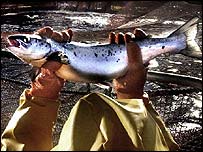|
The findings of research into farmed salmon in Scotland
and abroad have been published in the journal Science.
The American researchers claim that their work is the most comprehensive analysis to date of salmon toxin concentrations, looking at more than two metric tons of fish bought in shops in North America, South America and Europe.
They said levels of toxins were found to be highest in farmed salmon from Scotland and the Faroe Islands.
The largest study undertaken of pollutants in salmon found chemicals linked to cancer and birth defects in both fish from supermarkets and wholesalers.
Levels of 14 toxins were significantly higher in both European and North American farm-raised salmon than in fish caught in the wild, the scientists said.
"Our advice is that people should consume at least two portions of fish a week - one of which should be oily like salmon" - Food Standards Agency
Salmon farming, in which the fish are bred and fed in pens, is the reason why salmon is plentiful and affordable on supermarket shelves.
Dr Webster stressed that the PCB and dioxin levels found in Scottish salmon were significantly lower than the thresholds set by international watchdogs such as the European Union, the Food Standards Agency (FSA) or even the US FDA (Food and Drug Administration).
The assertion was backed by the Sir John Krebs, chairman of the FSA.
He said: "Our advice is that people should consume at least two portions of fish a week - one of which should be oily like salmon.
"There is good evidence that eating oily fish reduces the risk of death from recurrent heart attacks and that there is a similar effect in relation to first heart attacks.
|


